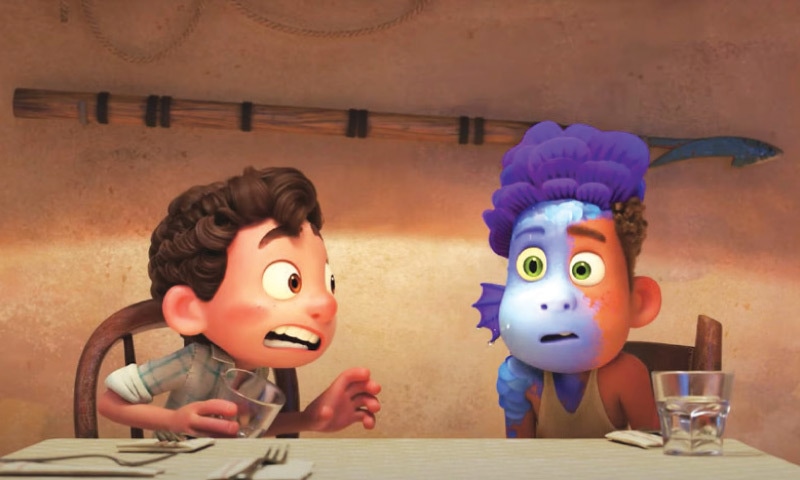Review: Infinite and Luca were just barely good enough
Infinite
Unoriginal and Insipid. Pre-Covid-19, when things were normal, these two terms were ones you never wanted in a blockbuster, but they were something that you got nonetheless every week at the movies.
The new Mark Wahlberg starrer Infinite is both of these words, and so much more. It is expensive, dumb, hackneyed, yawn-inducing, yet for some odd reason, cinematic.
Ah, what I’d do to waste my time on this movie at the movie theatre. Alas, this oddball amalgam of supernatural and sci-fi mumbo-jumbo, featuring the worst of Wanted, The Matrix and James Bond, came out on as a Paramount+ exclusive.
In the best of times it would make a few hundred million dollars in cinemas easy.
Both Infinite, starring Mark Wahlberg, and Pixar’s Luca, are good enough to spend time with. Just don’t go in with high expectations
As your typical “lost” hero, Wahlberg, half-awake, grunts through his scenes. He plays a reincarnated soul of a select group who call themselves “Believers”, whose past lives, memories and skill-sets are eventually carried over to their present-day incarnations when they hit puberty. Wahlberg’s character, Evan McCauley, however, was deemed schizophrenic since his youth, and the medicines kept him from getting his memory back.
That lack of past-life memory is a problem. The villain — a hammy Chiwetel Ejiofor, the head of the “Nihilists”, another clan of reincarnates — is after McCauley because the hero’s previous-self had secreted a supernatural egg that can destroy humanity.
McCauley and his supporters (Sophie Cookson, Jason Mantzoukas and Jóhannes Haukur Jóhannesson) go world-trotting from secret bases in the East Asian mountains to casinos and castles in London, Mexico and New York, where they fight baddies on giant suspended cranes, crashing planes and tumbling, well-sheened cars.

Not the best way to kill a hundred minutes of one’s time. Not the worst either.
Director Antione Fuqua (Training Day, Tears of the Sun, The Magnificent Seven remake, The Equalizer) has done better. At least, Infinite looks and moves like a legit motion picture, and not a lumberingly-paced, television-esque, high-budget OTT production.
Infinite is your typical, violent, action movie that barely comes under its PG-13 rating. Nothing excessive though.
Luca

Pixar delivering a somewhat dud of a film…who would have thought.
In hindsight one can understand why this came out on Disney+.
Luca is about a boy sea-monster who finds friendship, overcomes odds and goes to school. If subtext or gender inclusivity wasn’t so strongly wedged between the narrative of a pre-teen boy — there are strong LGBTQ+ elements in the direction (the director disagrees, though) — this would have been a great movie.
During Luca, photographs of Marcello Mastroianni and Fellini’s La Strada confirm the ’50s setting of an Italian Riviera town called Portorosso (a tip of the hat to Hayao Miyazaki’s neglected classic anime Porco Rosso, also set in a similar era and architecture). The town life is simple, and the people, despite their gruff exterior, are understanding adults. The only villain in town is a local bully who had won the town’s last two triathlons, and now owns a shimmering Vespa.

A league or two away in the nearby ocean lives Luca and his family. Initially scared of humans, Luca secrets a sense of wonder for the world above (ala. Ariel from The Little Mermaid — or in his case, the Little Mer-man).
Soon, Luca finds a new best bud named Alberto, who teaches him a secret: when sea-monsters leave the water, they turn into humans. Once on land, the two boys are smitten by the idea of owning a Vespa, and soon make another friend, Giulia, a gruff but kindhearted fisherman’s daughter. The three enter the triathlon to win enough money to stop the bully’s reign and buy a used Vespa, so the two boys can see the world together.
This is the first time I’ve been bored by a 95-minute Pixar movie; also, the production quality is a notch below the studio’s usual standard.
However, there’s a bigger issue to ponder than just production quality or boredom. Despite director Enrico Casarosa’s insistence on the contrary, when themes that are best suited for adults make their way into films about pre-teens, then that is when parents should start worrying about a far greater threat: early-age, subconscious pre-conditioning.
The direction of scenes and the handling of relationships, especially between Luca and Alberto, reeks of budding love and not best-bud friendship. In their first meeting, Alberto literally takes him out of the water into a man’s “whole new world” (he brings him from the sea to land, where he transforms from a sea-monster to a human); think of the scene as a metaphor for one coming out of the closet, and accepting who they are. At the parting shot of the film, Luca’s grandmother says, “Some people, they’ll never accept him.” “But some will,” she adds, “and he seems to know how to find the good ones.” If that’s not on the nose, then I don’t know what is.
While Pixar tells great stories for adults and children, the checks and balances of the studio seem to be failing on this one. There is a difference between telling a story of friendship, and a story that might give an inclination of there being something more to friendship — especially when characters are much too young to understand the subtext of the message they’re subconsciously hearing and accepting.
Luca is rated PG. Other than the misinterpretation of friendship, this is an okay enough Pixar film with good enough visual aesthetics.
Originally published in Dawn, ICON, July 4th, 2021










Comments